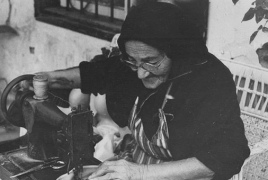The story of Armenian dressmakers from Turkey in focus of new book July 9, 2018 - 16:18 AMT PanARMENIAN.Net - Four generations of strong women and the saga of how their sewing skills helped them survive some of the darkest days of the 20th century shape the story on which Victoria Harwood Butler-Sloss drapes her century-spanning trilogy, the first volume of which has just been published in Cyprus, the Cyprus Mail reports. The half Armenian half British author describes “The Seamstress of Ourfa”, launched at a packed book-signing in the Centre of Visual Arts and Research in old Nicosia last week, as a “fictoir“. “It’s a blend of memoir and fiction, full of lies, misquotes and dead people but all historically accurate,” the author smilingly assures. The book introduces readers to the lost world of the Armenian community as life was lived in one of the ancient towns of the Ottoman Empire. Today named Sanliurfa, Ourfa has been known by other names in the course of its rich and turbulent history. Until the beginning of the 20th century, the town’s population was an almost equal division of Muslims and Armenian Christians with the addition of a smaller number of Assyrian Christians and Jews. But after the Armenian genocide of 1915, Ourfa became almost 100 per cent Muslim, recognised today as one of the most conservative towns in Turkey. Harwood Butler-Sloss’s family on her mother’s side was among the very few who survived the Armenian Genocide that took place in Ourfa. They remained there up to 1922 just before the modern Republic of Turkey was formed. “Many books have been written about the Genocide and the death marches and those who survived,” says Harwood Butler-Sloss, pointing out how her book is different. “My book is the first about an Armenian family who stayed in Ourfa. And there were some. Indeed, some stayed until the 1950s, and there are Armenians living there until this day. The thing is, few write about it – it is such a difficult subject.” “The Seamstress of Ourfa” and its two sequels in the Harwood Butler-Sloss trilogy all derive from stories told the author by female members from the Armenian side of her family. “They were all wonderful storytellers,” the California-based writer recalls in the garden of her old family house, not far from the Presidential Palace in Nicosia. “Actually they all had this ability to tell their stories in a very magical way. They would never say ‘somebody died of cirrhosis of the liver’. Rather, they would say ‘he died of a broken heart’. When relating these things in their own way the drama and the magic would really seem to happen… This always fascinated me because nowadays the nature of story-telling has changed so much… Now when we want to tell a story we tweet them… We are so very much matter of fact.” Victoria, 57, talks with an emotional purity and with great love about her Nicosia childhood and the women who filled it with their laughter and tears. There’s her great-grandmother Khatoun Agha Boghos and her sister-in-law Ferida (Vartouhi Agha Boghos); her grandmother Alice Avakian (the wife of Nicosia’s then foremost shirt maker Haygaz Avakian), and her daughters, Takouhi and Verginia, respectively Victoria’s mother and aunt. The EU does not intend to conduct military exercises with Armenia, Lead Spokesperson for EU Foreign Affairs and Security Policy Peter Stano says. A telephone conversation between Putin and Pashinyan before the CSTO summit is not planned, Peskov says. London’s Armenian community has been left feeling “under attack” after the city’s Genocide monument was vandalised. The United States believes there should be an international mission to provide transparency. Partner news |